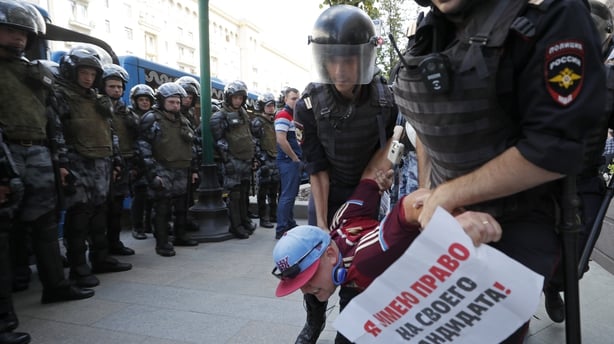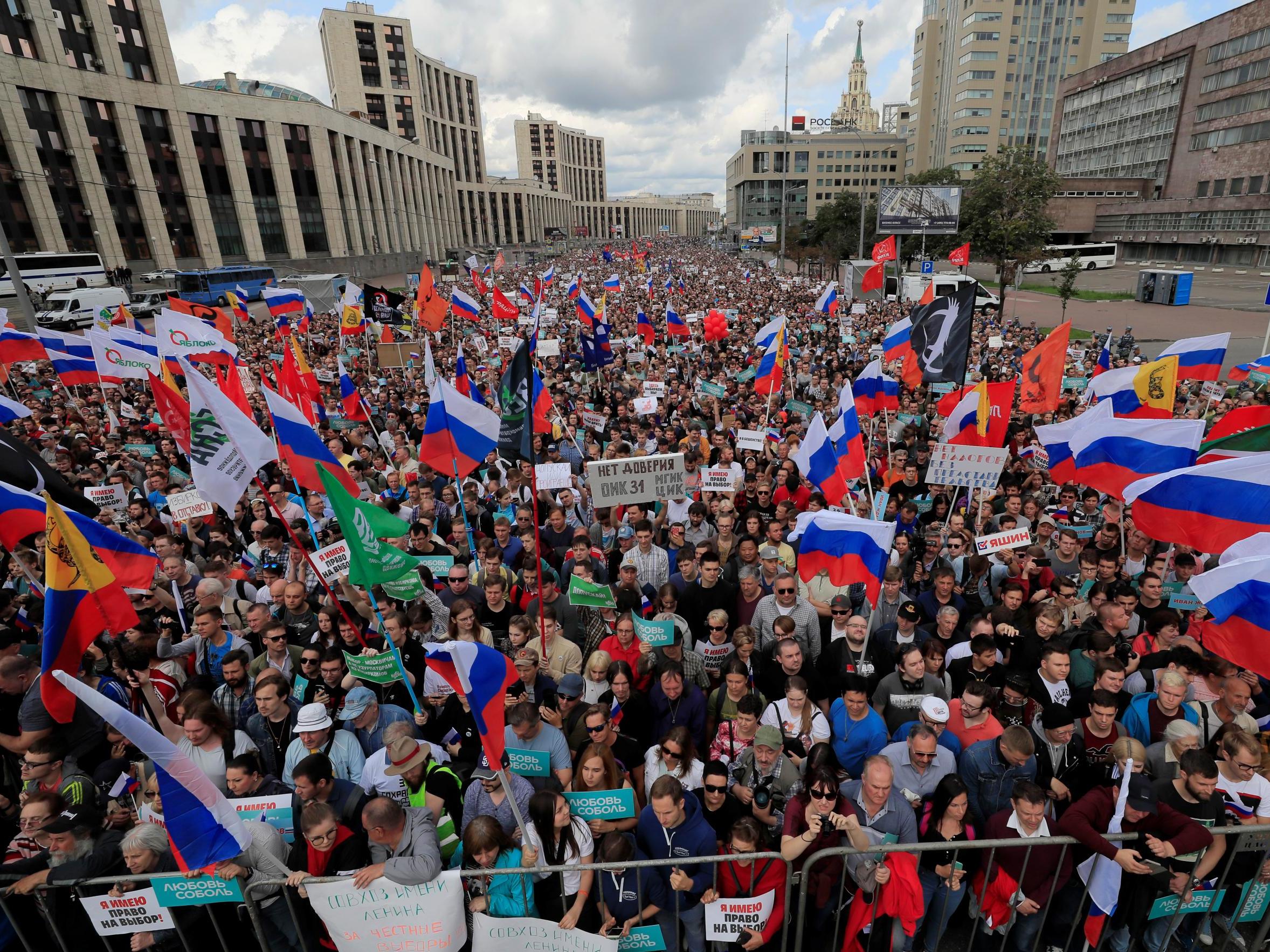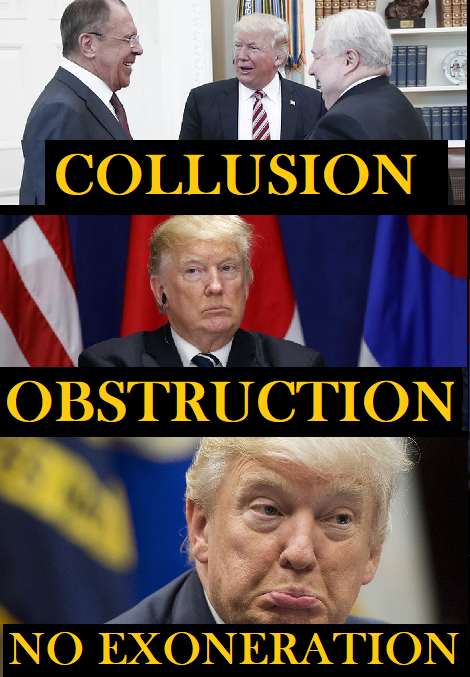'Absolutely Controlled MP'
Documents Link AfD Parliamentarian To MoscowRussian government emails show evidence of how Moscow is seeking to exploit the Alternative for Germany party in its propaganda war. The right-wing populists appear to be voluntary accomplices -- and a member of the federal parliament is at the center of the scandal. By DER SPIEGEL Staff

AfD parliamentarian Markus Frohnmaier and Russian President Vladimir Putin
April 12, 2019 10:48 AM
On a Thursday in April of last year, Markus Frohnmaier, a member of the German parliament representing the right-wing populist Alternative for Germany (AfD) party, pressed a large red button together with five men in a five-star hotel in Crimea. The word "future" appeared on an LED wall, marking the beginning of the fourth Yalta International Economic Forum. The situation was reminiscent of 1980s TV show, a bit stiff, a bit artificial. You can find videos and photos of the event online.
The men who pressed the button with the German politician are faithful supporters of Russia and, seemingly, of its president, Vladimir Putin. They included an Austrian deputy mayor of the right-wing populist Austrian People's Party (FPÖ), as well as a former lawmaker in the Russian parliament, the Duma, and Sergei Aksyonov, the prime minister of Crimea installed by Putin. Russia annexed the peninsula in 2014 in violation of international law. Since then, the United States and the European Union have imposed sanctions on the country. But that didn't keep Frohnmaier from traveling to Yalta.
After the opening of the forum, he gave an interview to the Russian international broadcaster RT in the lobby of the luxury hotel. Frohnmaier said that when you drive along the switchbacks in Crimea, it feels like Verona: the architecture, the wine, the seaside location. "What more could you want?" The sanctions, the member of the German parliament said, finally need to end: "It is simply fact that Crimea is now Russian Crimea. The people who view this highly critically won't be able to change that. Crimea isn't coming back, and I think people just have to accept that now."
Frohnmaier sounded like a PR agent for the Russian president. He often sounds like that on many days.
The AfD, which was founded six years ago as a euro-skeptic party, has proved to be a stroke of luck for Putin. It shares the Russian president's goal of attacking the establishment. Putin wants to break the West's power by driving a wedge through it. The AfD and the Kremlin also share a pronounced anti-American stance, as well as a disdain for modern values and marriage equality for same-sex couples.
The Russian leadership sees the biggest opposition party in the Germany parliament, the Bundestag, as an ally in the war against "degenerate Europe," as neo-fascist ideologue Alexander Dugin once described it. Their common goal is to weaken the enemy. Exclusive documents from the Moscow state apparatus show how this goal is to be attained. They also show how AfD politicians are, in this sense, turning themselves into Putin's pawns.
Worrisome Findings
Reporting conducted jointly by DER SPIEGEL, German public broadcaster ZDF, the BBC and the Italian newspaper La Repubblica has uncovered how Moscow is weakening Western European democracies and trying to enlist right-wing parties to help it do that. The leaked emails and documents provide telling insights on how these kinds of strategies for attaining influence in the West emerge, how these parties came into Putin's political sphere of influence and which instruments are being used to carry out the plans.
The Dossier Centre in London provided a large part of the material, along with its own research. The research center is financed by Russian businessman and Kremlin critic Mikhail Khodorkovski. DER SPIEGEL and its partners have analyzed the materials both in terms of content and technologically and have deemed them to be authentic.
The material is comprised of several bundles of different origins, but they contain documents that complement and correspond with each other in ways we believe confirm their authenticity.
Central documents were translated with the help of certified translators. Intelligence services also deem them to be plausible. The form and construction of some documents also resemble other documents intercepted by intelligence experts.
The new findings are worrisome, given that many in Europe are concerned Russia might try to influence the elections for the European Parliament in late May. Annegret Kramp-Karrenbauer, the head of the center-right Christian Democratic Union (CDU), recently warned on ZDF that the Russian government is "putting a lot of effort into weakening, into destabilizing the countries in the EU and its close neighbors."
The emails include, for example, a strategy paper created before the 2017 German federal election that describes several "foreign-policy activities," ranging from the "organization of meetings, vigils and other protest actions in EU countries to the successful support of resolutions in the national parliaments of the EU and to media campaigns." The goal was to promote Russian interests and enable the "discrediting" of Moscow's opponents.
Exploiting Right-Wing Populists
Who could be better suited for this than the AfD's people, who are almost all foreign-policy novices? Experts unanimously agree that, for years, Russia has been seeking to exploit right-wing populists as a megaphone for its strategy of expansion in Crimea and in eastern Ukraine, to provide legitimacy for dubious elections and as agitators in German town squares. Previously, there hasn't been any evidence that this kind of planning had been linked to the higher levels of the Russian state apparatus.
Now these activities can be documented in detail. The revelations are particularly vivid when it comes to AfD lawmaker Markus Frohnmaier. He plays a central role in the strategy paper, which was sent from the Russian Duma to the highest levels of leadership in the presidential administration. The people behind it made no secret of how they view the now 28-year-old political neophyte: as a useful idiot.
The document states, "we will have our own absolutely controlled MP in the Bundestag." An AfD member of the Bundestag willing to help fulfil Moscow's aims -- does this still represent a free, independent mandate?
DER SPIEGEL is also in possession of a draft of an English-language "action plan" for Frohnmaier's election campaign in which "material" and "media support" for Frohnmaier is requested in exchange for a promise that the candidate would diligently work to promote the issues most important to Moscow as a parliamentarian in the Bundestag.
Most of the data in the files consists of emails from former Berlin embassy attaché Daniil Bisslinger, who now works in Moscow's Foreign Ministry. He sent both professional and private mails via an email account using a Russian provider. Special forensic software did not find any evidence that they might have been manipulated.
The over 10,000 emails and 32,863 images also contain a large amount of private daily communication that DER SPIEGEL did not analyze, as well as countless verifiable facts. The second bundle of 4,436 emails from the Russian presidential administration was also checked by IT specialists. The revealing email about Frohnmaier came from this trove.
A Potential Partner for the Russians
It is hard to know when Frohnmaier's love for Russia first developed, but Bisslinger, a Russian career diplomat, played an important role in it.
On August 10, 2014, the Russian made an appearance at the Baden-Württemberg state convention of the AfD's youth wing, the Young Alternative for Germany (JA), which Frohnmaier was leading at the time. "Maintain and expand on contact," JA head Frohnmaier wrote after the meeting in Stuttgart. In an internal report, he enthused that Bisslinger's speech about the real reasons for the Ukraine crisis and about "Western expansion efforts" had been a "high-point of the event." The election of the new JA state head, he wrote, "nearly became a secondary matter to this guest appearance." Frohnmaier also forwarded his praise to the Russian, including a photo of himself and Bisslinger in front of the Russian and the German national colors.
It was to become the beginning of a wonderful friendship between the Young Alternative for Germany, their mother party and the smooth Russian representative.
Russia annexed Crimea in 2014, and it began getting more involved in the Syrian conflict in 2015. During this phase, Moscow also began seeking to develop closer ties with right-wing parties across Europe, including Austria's FPÖ and Italy's Lega Nord. A Russian bank even gave Marine Le Pen's Front National in France a loan of approximately 9 million euros.
The AfD was also a potential partner for the Russians. Although economist Bernd Lucke, a trans-Atlanticist focused on euro-skeptic policies, was still leading the party in 2014, his base had widespread sympathy and admiration for Russia and its president, who didn't seem to hold any punches. As early as September 2013, Lucke's fellow board member Alexander Gauland, who is now party chairman, wrote in a position paper that Germany's foreign policy should become more akin to that of the Prussians: "The relationship to Russia should always be something worth carefully tending to."
Bisslinger's emails also document a meeting between Gauland and Armin-Paulus Hampel, the then AfD state leader in Lower Saxony, at the Russian Embassy in September 2014.
AfD party leader Alexander Gauland (ledt) and Russian ideologist Alexander Dugin: The Russian leadership sees the biggest opposition party in the Germany parliament, the Bundestag, as an ally in the war against "degenerate Europe."
Illustration: Simon Prades für den Spiegel
AfD party leader Alexander Gauland (ledt) and Russian ideologist Alexander Dugin: The Russian leadership sees the biggest opposition party in the Germany parliament, the Bundestag, as an ally in the war against "degenerate Europe."
That same day, Hampel thanked the young attaché "for the good conversation today." He wrote that he would be "very pleased to maintain contact" and suggested they meet for another meal a few days later. Bisslinger had to cancel, because he was on vacation, but he did sent him a link to a briefing by the Russian Defense Ministry contradicting claims of Russian involvement in the downing of flight MH17 and instead blaming Ukraine. Bisslinger wrote that he would be "happy to meet" after his return.
And thus, the two sides grew closer. A month after the meeting, Bisslinger traveled to southern Germany on the invitation of the right-wing party, this time to the Musikhalle Ludwigsburg, an event space near Stuttgart, for a joint appearance with Frohnmaier and Gauland. The subject of the evening: "Russia - Dialogue Instead of Sanctions."
The Junge Alternative Zeitung, the JA's newspaper, argued that the Russian guest "didn't hold back in his criticism of the West," and wrote that "in his speech, Gauland, in turn, showed a great deal of understanding for the Russian position." It had been an evening of kindred spirits.
'Every Donation Is Welcome'
Bisslinger's emails often reveal how deep the AfD base's affection for Russia is. At times, an AfD candidate for the state parliament from Stuttgart asked the Russians for a donation for his campaign, because "every donation is welcome." Frohnmaier's JA colleague Reimond Hoffmann contacted the diplomat and asked him for help in his job search: "One application aims for a position as a trainee at Gazprom, the other application for a position at the embassy."
The young AfD functionary made clear which country he felt an affinity for. He wrote that he thought "at a time in which economic war is being conducted against Russia" that he "could help represent Russian interests in Germany." It is unclear from the documents how Bisslinger reacted to the request. When asked about it, Hoffmann answered that he has no recollection of the applications.
There is nothing reprehensible in and of itself about embassy employees trying to establish contacts with politicians, cultural figures or businesspeople in the country in which they are posted. On the contrary, it is part of their job. But it can be more problematic when these contacts become one-sided and have a specific aim, when emails are exchanged about donations and jobs, or when politicians are selected to become tools for a larger long-term strategy of political influence. And when these politicians are described as being "absolutely controlled" by Moscow, it far exceeds the boundaries of normal and appropriate political and diplomatic behavior.
In response to a request for comment, the Russian Embassy in Berlin argued that did not view it as "problematic when our employees cultivate contacts to different political forces and social structures in the guest country, unless these are classified as being extremist or radical." The AfD, it argued, is no exception to this rule, given that it is currently the largest opposition group in the Bundestag. "Of course, there cannot be any talk of financing of political activities in Germany, especially through donations."
Information Warfare
Information warfare, and the desire to control the media coverage of a political event, is a central element of Moscow's strategy. State channels like RT Deutsch, it's German-language website, or Sputnik have been broadcasting "alternative" news in Germany for years. AfD politicians, including members of the Bundestag, are regular guests on those media. In Russia, they are often presented to the domestic audience as high-ranking representatives of the German government, even when they are lower-ranking lawmakers, like Markus Frohnmaier.
The dissemination of propaganda through state media is just one part of the Russian attempt to gain influence. That effort also includes state-supported troll factories that flood social media around the world with pro-Russian messages. It includes hacker groups steered by the Russian intelligence services, with names like "APT 28," "Snake" and "Sandworm," that attack the computers of the Bundestag or the German government network and extract data. And it includes people who, in keeping with the Russian government's goals, incite protests in their home countries and foment unrest.
Islamophobic marches in Germany by the PEGIDA movement are useful for Moscow. So are the yellow-vest protests in France. As were the 2016 protests unleashed by the story of 13-year-old Lisa, the daughter of a Russian-German family, who claimed she had been raped by dark-skinned men. Even though it was quickly found to be a lie, the protests continued for weeks. They were led by, among others, a man who now works for an AfD member of the Bundestag with roots in Kazakhstan.
https://www.spiegel.de/international/ge ... 61509.html








